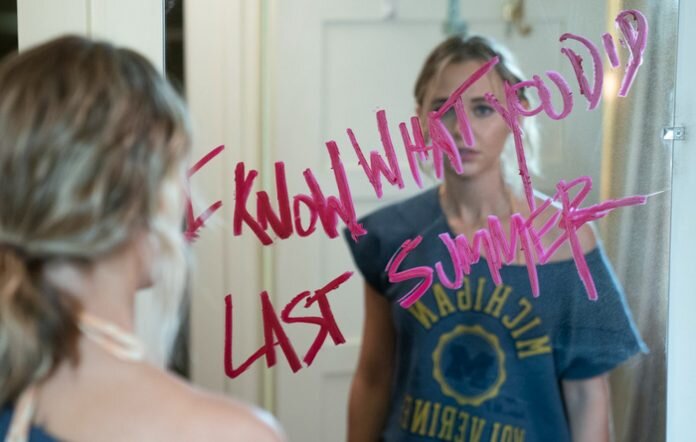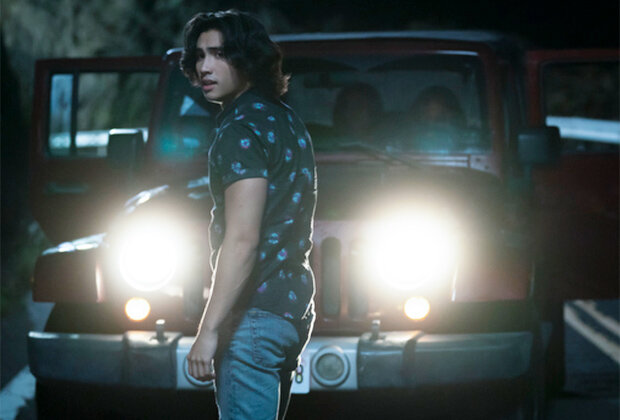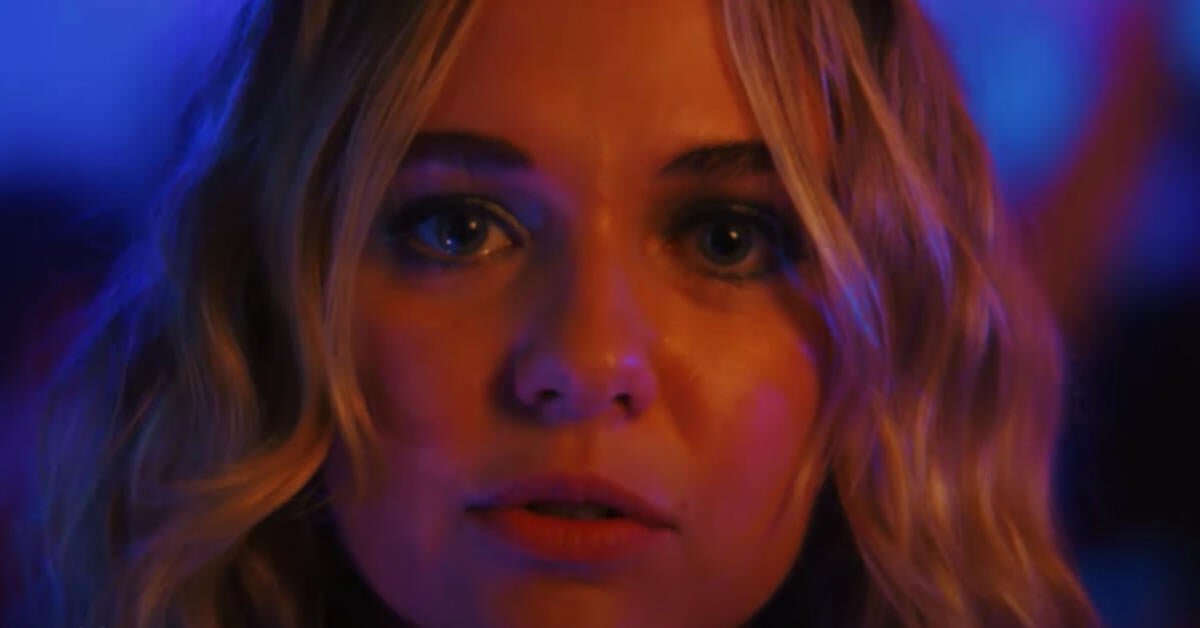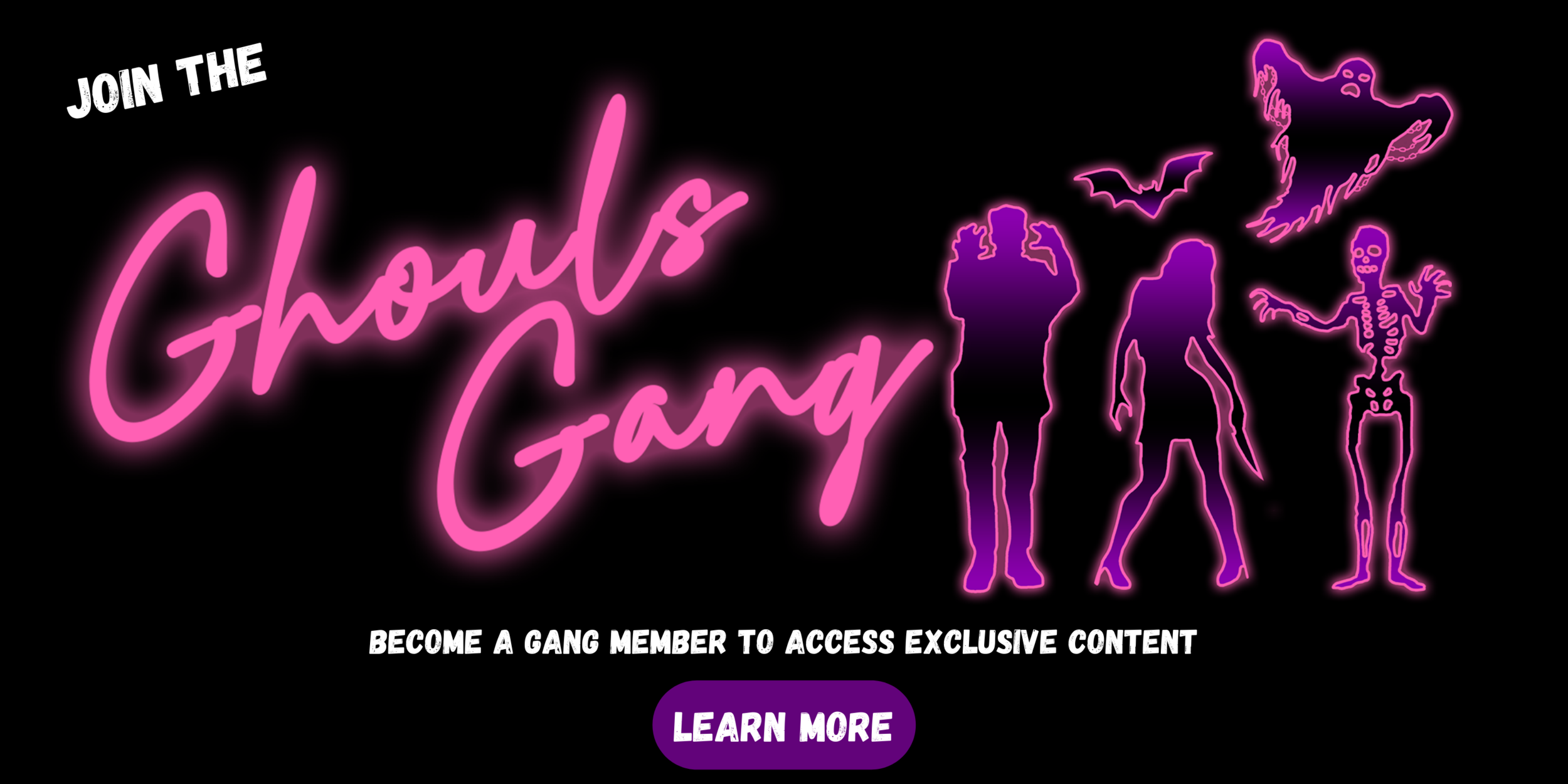[TV Review] Amazon Studios’ I Know What You Did Last Summer is a Personal Reimagining of a Slasher Classic

This review is written based on the first four episodes of the season
The original I Know What You Did Last Summer remains one of the most beloved entries in the teen slasher boom of the late 1990s. Released on the heels of the seminal Scream, the 1997 slasher adaptation of Lois Duncan’s 1973 novel is a contemporary retelling of a classic urban legend mixed with a cautionary tale about personal responsibility and guilt. Starring some of the hottest young actors of the time, the film examines Gen X fears of adulthood under the guise of an outlandish murder mystery. Twenty four years later, Amazon Studios’s remake of the horror classic brings this story of careless youth and devastating consequences to a new generation. While the bones of the original film's plot survive, a group of friends attempt to cover up a deadly hit and run and find themselves hunted by a mysterious stranger who knows their secret, little remains of the original story’s details. But Kevin Williamson’s script didn’t exactly hue closely to the source material itself. The new series from writer and executive producer Sara Goodman is an encapsulation of Gen Z culture told through the lens of an episodic slasher series that lovingly depicts the contradictions of burgeoning adulthood alongside the difficulty in ever truly escaping the past.
Lennon and Allison (Madison Iseman) are identical twins celebrating their high school graduation and preparing for life in the real world. The girls have a tense relationship stemming from the unhealed wounds of their mother’s long ago suicide. Complicating this dynamic is their father Bruce (Bill Heck) who clearly favors the popular and carefree Lennon over bitter loner Allison. At a drug fueled graduation party, the twins have a fight that quickly spirals into harsh insults and devastating accusations. When a tragic accident occurs later that night, Lennon and her friends Margot (Brianne Tju), Johnny (Sebastian Amoruso), Dylan (Ezekiel Goodman), and Riley (Ashley Moore) make a life-altering choice to protect their future plans, hiding the evidence of their crime and going their separate ways. Reuniting one year later, the former friends find themselves hunted by someone who knows their terrible secret and is hellbent on revenge.

Except for the central premise and the iconic title, little remains of the 1997 film in this new iteration. Rather than an east coast fishing village, Lennon and her friends commit their deadly act of carelessness on the sun-drenched shores of Hawaii. The lush setting and beach vibe is in striking contrast to the rocky cliffs and dour docks of the original. Also gone is the hook toting killer hunting the teens from under the massive hood of his black rain slicker. Lennon is stalked by the driver of a mysterious black truck who leaves threats scrawled in lipstick on her closet mirror along with the bloody head of a goat, a sly nod to conversations she had at the scene of the crime. No longer an updated urban legend, Goodman’s series spends more time exploring the lives of its tragic teens and wisely avoids simply glorifying their grisly deaths.
In fact, the family drama and complicated friendships often overshadow the central murder mystery making it nearly impossible not to root for these deeply flawed characters. The supporting cast of friends all have distinguishable personalities rising above the stock characterizations of teen victims that plague lesser slashers. Allison and Lennon are heartbreaking as sisters struggling to recover from a terrible tragedy and trying to figure out who they are as individuals in a world that sees them as intrinsically linked. Lennon’s hard partying and promiscuity cover a painful refusal to acknowledge the truth of her loss while Allison’s self-imposed isolation screams of unresolved trauma and a fear of getting close to anyone else. Iseman delivers a magnetic performance, skillfully playing dual roles and weaving between two diametrically opposed characters at the heart of the story. She brings relatable nuances out of a complex narrative that could easily become muddled. While the dialogue is occasionally cringe, all of the central characters feel like real people, transcending their well-crafted personas to reveal frightened young adults terrified of the world they're about to enter.
Perhaps the most welcome addition to the updated story is it’s diversity. The 1990s were not known for inclusive casting and the original film stands as a prime example of non-white actors relegated to the best friend roles of white leads. While this is a problem that has pervaded the industry since its inception, it's worth pointing out here because this is a story specifically dealing with privilege. I Know What You Did Last Summer’s central conflict hinges on the characters' fear of how reporting an accident will ruin the bright futures they have planned. While understandable, this dilemma begs questions about privilege and preferential treatment by law enforcement available to white people of means and essentially no one else. While Goodman’s series is much more racially diverse with many non-white characters central to the plot, it still shys away from addressing these systemic issues that are arguably more relevant today than 24 years ago. Perhaps as the season progresses an exploration of these themes will arise, but so far Goodman presents her characters on equal footing in society despite coming from different races and socioeconomic statuses. While it’s refreshing to see a world we wish we could have, this feels like a missed opportunity to examine a relevant problem.

Goodman’s adaptation shines when it’s examining identity and grief through shared trauma. Without spoiling anything, the central hook is exponentially more personal than the original. While the 1997 film touched on guilt and morality, the updated version explores the emotional weight of the story, building on themes of denial in the face of profound loss, unresolved grief, and trauma-informed parenting. While the subject matter is heavy, each episode includes moments of levity and tension-breaking comedy. However this nuanced tone often struggles to find its footing. Some jokes land well adding dark humor to the dense subject matter while others feel forced and callous. The kills are brutal and bloody, more akin to the slashers of the moment than it’s relatively bloodless predecessor. Expanding the world provides opportunity for a higher body count and Goodman wastes no time getting to the gory details. Her version is much more explicit in it’s gruesome deaths but also in it’s debaucherous sexiness as the teens engage in a seemingly endless flirtation implying a sexual fluidity in striking contrast with the rigid gender norms of the 90s.
While sometimes derided for it’s overly simplistic story and frustrating conclusion, the original I Know What You Did Last Summer looms large in the world of teen horror. Spawning two sequels and boasting performances from horror royalty, the original is perhaps second only to Scream in defining a cultural era of horror filmmaking. Goodman manages to update the iconic story so that it unfolds in new and compelling ways, adding emotional depth to a relatively simplistic cautionary tale. Her version encapsulates the new generation of teens entering adulthood by examining the expectations thrust upon them by a cruel and unforgiving world in the same way the original film did for Gen Xers. With exceptional performances and a riveting emotional arc, Amazon Studios’s I Know What You Did Last Summer compels us to root for the humans in the story rather than their creative deaths, perhaps the highest achievement for a slasher.

When people think of horror films, slashers are often the first thing that comes to mind. The sub-genres also spawned a wealth of horror icons: Freddy, Jason, Michael, Chucky - characters so recognisable we’re on first name terms with them. In many ways the slasher distills the genre down to some of its fundamental parts - fear, violence and murder.
Throughout September we were looking at slasher films, and therefore we decided to cover a slasher film that could be considered as an underrated gem in the horror genre. And the perfect film for this was Franck Khalfoun’s 2012 remake of MANIAC.
In the late seventies and early eighties, one man was considered the curator of all things gore in America. During the lovingly named splatter decade, Tom Savini worked on masterpieces of blood and viscera like Dawn of the Dead (1978), a film which gained the attention of hopeful director William Lustig, a man only known for making pornography before his step into horror.
Looking for some different slasher film recommendations? Then look no fruther as Ariel Powers-Schaub has 13 non-typical slasher horror films for you to watch.
Even though they are not to my personal liking, there is no denying that slasher films have been an important basis for the horror genre, and helped to build the foundations for other sub-genres throughout the years.
But some of the most terrifying horrors are those that take place entirely under the skin, where the mind is the location of the fear. Psychological horror has the power to unsettle by calling into question the basis of the self - one's own brain.
On Saturday, 17th June 2023, I sat down with two friends to watch The Human Centipede (First Sequence) (2009) and The Human Centipede 2 (Full Sequence) (2012). I was nervous to be grossed out (I can’t really handle the idea of eating shit) but excited to cross these two films off my list.
Many of the most effective horror films involve blurring the lines between waking life and a nightmare. When women in horror are emotionally and psychologically manipulated – whether by other people or more malicious supernatural forces – viewers are pulled into their inner worlds, often left with a chilling unease and the question of where reality ends and the horror begins.
Body horror is one of the fundamental pillars of the horror genre and crops up in some form or another in a huge variety of works. There's straightforward gore - the inherent horror of seeing the body mutilated, and also more nuanced fears.
In the sweaty summer of 1989, emerging like a monochrome migraine from the encroaching shadow of Japan’s economic crash, Shin’ya Tsukamoto’s Tetsuo: The Iron Man shocked and disgusted the (very few) audiences originally in attendance.
Whether it's the havoc wreaked on the human body during pregnancy, emotional turmoil producing tiny murderous humans or simply a body turning on its owner, body horror films tend to be shocking. But while they're full of grotesque imagery, they're also full of thoughtful premises and commentary, especially when it comes to women, trauma, and power.

RELATED ARTICLES
For years, I have been a woman obsessed with the sensational work of manga writer and artist Junji Ito
Originally starting in the Netherlands in 1999, Big Brother is a hit reality show that derived its name from a character in George Orwell’s dystopian novel, Nineteen Eighty-Four. Throughout its run, Big Brother has spawned over 500 series across 62 countries to date.
Buffy Anne Summers is more than just a vampire slayer. She taught us to be brave. To never give up and to always fight for who and what we love, all whilst wearing a cute outfit in the process. That is why 19 years after its final episode, Buffy the Vampire Slayer remains a cult classic that will make a difference to more generations to come. Remember, if the apocalypse calls, beep me!
Rather than a retro ‘60s comic book queen or a ‘90s sitcom with a teenager and a talking cat, Sabrina Spellman of The Chilling Adventures of Sabrina (CAOS) is a 21st century witch with 17th century problems.
brothers Dean and Sam travel cross country on the hunt for demons, ghosts and things that go bump in the night…
The film Scream (1996) was self-aware slasher at its finest…
Marianne, born on Tuesday, she was happy on Wednesday, got married on a Thursday, became a witch on a Friday…
The latest Shudder Exclusive documentary takes a dip into the horror vaults to follow the life and career of Universal’s Frankenstein’s Monster, Boris Karloff
Created by The Boulet Brothers, Dragula follows the trials and tribulations of eleven contestants as they battle it out to be drag’s number one super monster…
Behind The Monsters is an in depth examination of how some of the most famous horror antagonists were created…

EXPLORE
Films that blend horror with romance always fascinate me; add a niche contemporary setting that I’ve never heard of before and I’m hooked. Cannibal Mukbang was made by Aimee Kuge, a young woman from New York, and I was privileged to spend a little time talking with her over Zoom…
Now it’s time for Soho’s main 2023 event, which is presented over two weekends: a live film festival at the Whirled Cinema in Brixton, London, and an online festival a week later. Both have very rich and varied programmes (with no overlap this year), with something for every horror fan.
In the six years since its release the Nintendo Switch has amassed an extensive catalogue of games, with everything from puzzle platformer games to cute farming sims to, uh, whatever Waifu Uncovered is.
A Quiet Place (2018) opens 89 days after a race of extremely sound-sensitive creatures show up on Earth, perhaps from an exterritorial source. If you make any noise, even the slightest sound, you’re likely to be pounced upon by these extremely strong and staggeringly fast creatures and suffer a brutal death.
Have I told you about Mayhem Film Festival before? It’s a favourite event of mine, so I’ve blurted about it in anticipation to many people I know. The event has just passed, so now is the time to gush its praises to those I don’t know.
Loop Track, Thomas Sainsbury’s directorial debut, has such a sparse description that it’s really difficult to know what you’re stepping into when it starts. It’s about Ian (played by the director), who is taking a trek through the New Zealand bush….
For a movie that doesn’t even mention the word “vampire” once throughout the length of the film, Near Dark (1987) is a unique entry in the vampire film genre.
If you like cults, sacrificial parties, and lesbian undertones then Mona Awad’s Bunny is the book for you. Samantha, a student at a prestigious art university, feels isolated from her cliquey classmates, ‘the bunnies’.
Kicking off on Tuesday 17th October, the 2023 edition considers the cinematic, social and cultural significance of the possessed, supernatural and unclean body onscreen.
I was aware of the COVID-19 pandemic before I knew that’s what it would be called, and before it ever affected me personally. My husband is always on top of world events, and in late 2019, he explained what was happening around the globe.


![[Editorial] 5 Slasher Short Horror Films](https://images.squarespace-cdn.com/content/v1/5fe76a518d20536a3fbd7246/1696358009946-N8MEV989O1PAHUYYMAWK/Screenshot+2023-10-03+at+19.33.19.png)
![[Ghouls Podcast] Maniac (2012) with Zoë Rose Smith and Iona Smith](https://images.squarespace-cdn.com/content/v1/5fe76a518d20536a3fbd7246/1696356006789-NYTG9N3IXCW9ZTIJPLX2/maniac.jpg)
![[Editorial] If Looks Could Kill: Tom Savini’s Practical Effects in Maniac (1980)](https://images.squarespace-cdn.com/content/v1/5fe76a518d20536a3fbd7246/1694952175495-WTKWRE3TYDARDJCJBO9V/Screenshot+2023-09-17+at+12.57.55.png)
![[Editorial] Deeper Cuts: 13 Non-Typical Slashers](https://images.squarespace-cdn.com/content/v1/5fe76a518d20536a3fbd7246/1694951568990-C37K3Z3TZ5SZFIF7GCGY/Curtains-1983-Lesleh-Donaldson.jpg)
![[Editorial] Editor’s Note: Making a slash back into September](https://images.squarespace-cdn.com/content/v1/5fe76a518d20536a3fbd7246/1694354202849-UZE538XIF4KW0KHCNTWS/MV5BMTk0NTk2Mzg1Ml5BMl5BanBnXkFtZTcwMDU2NTA4Nw%40%40._V1_.jpg)
![[Editorial] 8 Mind Horror Short films](https://images.squarespace-cdn.com/content/v1/5fe76a518d20536a3fbd7246/1693504844681-VPU4QKVYC159AA81EPOW/Screenshot+2023-08-31+at+19.00.36.png)
![[Editorial] Eat Shit and Die: Watching The Human Centipede (2009) in Post-Roe America ](https://images.squarespace-cdn.com/content/v1/5fe76a518d20536a3fbd7246/1691245606758-4W9NZWE9VZPRV697KH5U/human_centipede_first_sequence.original.jpg)
![[Editorial] Top 15 Female-Focused Mind Horror Films](https://images.squarespace-cdn.com/content/v1/5fe76a518d20536a3fbd7246/1691247166903-S47IBEG7M69QXXGDCJBO/Image+5.jpg)
![[Editorial] 8 Body Horror Short films](https://images.squarespace-cdn.com/content/v1/5fe76a518d20536a3fbd7246/1690838270920-HWA5RSA57QYXJ5Y8RT2X/Screenshot+2023-07-31+at+22.16.28.png)
![[Editorial] Metal Heart: Body Dysmorphia As A Battle Ground In Tetsuo: The Iron Man (1989)](https://images.squarespace-cdn.com/content/v1/5fe76a518d20536a3fbd7246/1690190127461-X6NOJRAALKNRZY689B1K/Screenshot+2023-07-24+at+10.08.27.png)
![[Editorial] Top 15 Female-Focused Body Horror Films](https://images.squarespace-cdn.com/content/v1/5fe76a518d20536a3fbd7246/1689081174887-XXNGKBISKLR0QR2HDPA7/download.jpeg)
![[TV Review] Junji Ito Maniac: Japanese Tales of the Macabre (2023)](https://images.squarespace-cdn.com/content/v1/5fe76a518d20536a3fbd7246/1675626891240-UYL6BTD1GV9I3UEUQPZG/image2.jpg)
![[TV Review] Dead Set (2008)](https://images.squarespace-cdn.com/content/v1/5fe76a518d20536a3fbd7246/1664787670655-G8UTH9HDQCNBIE6K9WA2/Screenshot+2022-10-03+at+09.58.28.png)
![[TV Review] Buffy The Vampire Slayer (1997- 2003)](https://images.squarespace-cdn.com/content/v1/5fe76a518d20536a3fbd7246/1664172852528-QN3YQI0K5M7OHWXY1EKR/buffy.jpeg)
![[TV Review] The Chilling Adventures of Sabrina (2018-2020)](https://images.squarespace-cdn.com/content/v1/5fe76a518d20536a3fbd7246/1664172038833-EBYFI7STZ97CMI13AR99/SABRINA2.jpeg)
![[TV Review] Supernatural (2005-2020)](https://images.squarespace-cdn.com/content/v1/5fe76a518d20536a3fbd7246/1655573865841-QLDABX1BTQD62WL5171W/Image%2B1%2B%25284%2529.jpg)
![[TV Review] Scream TV Series (2014) Season 1](https://images.squarespace-cdn.com/content/v1/5fe76a518d20536a3fbd7246/1655656570649-S2516JEUBDALYLSRZT04/Screen-shot-2015-06-30-at-6.55.43-PM.png)
![[TV Review] Marianne (2019)](https://images.squarespace-cdn.com/content/v1/5fe76a518d20536a3fbd7246/1642852814142-Q7N595RY5ECXF1XKRC34/marianne+top.jpeg)
![[TV Review] Boris Karloff: The Man Behind the Monster (2021)](https://images.squarespace-cdn.com/content/v1/5fe76a518d20536a3fbd7246/1644088673462-SM7VB9ORKL7LFYE3RLGA/Image+1+%283%29.jpg)
![[TV Review] The Boulet Brothers’ Dragula Season 4](https://images.squarespace-cdn.com/content/v1/5fe76a518d20536a3fbd7246/1640260117973-N8H35J9LC5TBNV8SUFBU/Image+1+%283%29.png)
![[TV Review] Behind The Monsters (2021)](https://images.squarespace-cdn.com/content/v1/5fe76a518d20536a3fbd7246/1636655798596-NOAWXH9FGRLY4TVXUPSX/Image+1+%285%29.jpg)





















![[Editorial] Soho Horror Film Festival: Interview with Aimee Kuge on Cannibal Mukbang](https://images.squarespace-cdn.com/content/v1/5fe76a518d20536a3fbd7246/1701808004722-9M8SZ2UXY52QBQBR4NTI/img20230818_15150780.JPG)
![[Editorial] 10 Films & Events to Catch at Soho Horror Film Fest 2023](https://images.squarespace-cdn.com/content/v1/5fe76a518d20536a3fbd7246/1700819417135-299R7L4P0B676AD3RO1X/Screenshot+2023-11-24+at+09.41.52.png)
![[Editorial] 9 Horror Nintendo Switch Games To Play](https://images.squarespace-cdn.com/content/v1/5fe76a518d20536a3fbd7246/1697214470057-3XZXX8N4LYIMDFWS6Z3P/Screenshot+2023-10-13+at+17.20.13.png)
![[Mother of Fears] Mothering in Silence in A Quiet Place (2018)](https://images.squarespace-cdn.com/content/v1/5fe76a518d20536a3fbd7246/1696445921315-HZJ2DZYQIH6VVWXBO2YL/Screenshot+2023-10-04+at+19.52.29.png)
![[Event Review] Highlights from Mayhem Film Festival 2023](https://images.squarespace-cdn.com/content/v1/5fe76a518d20536a3fbd7246/1697624582491-MPT2VB9RRGU6OG7L6UKL/Mayhem+2023.jpg)
![[Editorial] Mayhem Festival: Interview with Thomas Sainsbury on Loop Track (2023)](https://images.squarespace-cdn.com/content/v1/5fe76a518d20536a3fbd7246/1697186472899-WC4RR0TW7L7LMFEBGPA2/Tom+Sainsbury.jpg)
![[Editorial] Keeping Odd Hours: A Retrospective on Near Dark (1987)](https://images.squarespace-cdn.com/content/v1/5fe76a518d20536a3fbd7246/1696445070868-HU9YIL3QPBCL1GW47R3Z/Screenshot+2023-10-04+at+19.36.53.png)
![[Editorial] 5 Female Focused Horror Book Recommendations](https://images.squarespace-cdn.com/content/v1/5fe76a518d20536a3fbd7246/1696441981361-52EQCTJ7AT2QF1927GM7/919xtm6d3fL._AC_UF894%2C1000_QL80_.jpg)
![[Editorial] What to Watch at This Year's Cine-Excess International Film Festival 2023](https://images.squarespace-cdn.com/content/v1/5fe76a518d20536a3fbd7246/1697213510960-REV43FEOZITBD2W8ZPEE/Screenshot+2023-10-13+at+17.01.15.png)
![[Editorial] Cherish Your Life: Comfort in the SAW Franchise Throughout and Beyond the COVID-19 Pandemic](https://images.squarespace-cdn.com/content/v1/5fe76a518d20536a3fbd7246/1695487675334-MYPCPYYZQZDCT548N8DI/Sc6XRxgSqnMEq54CwqjBD5.jpg)

I can sometimes go months without having a panic attack. Unfortunately, this means that when they do happen, they often feel like they come out of nowhere. They can come on so fast and hard it’s like being hit by a bus, my breath escapes my body, and I can’t get it back.